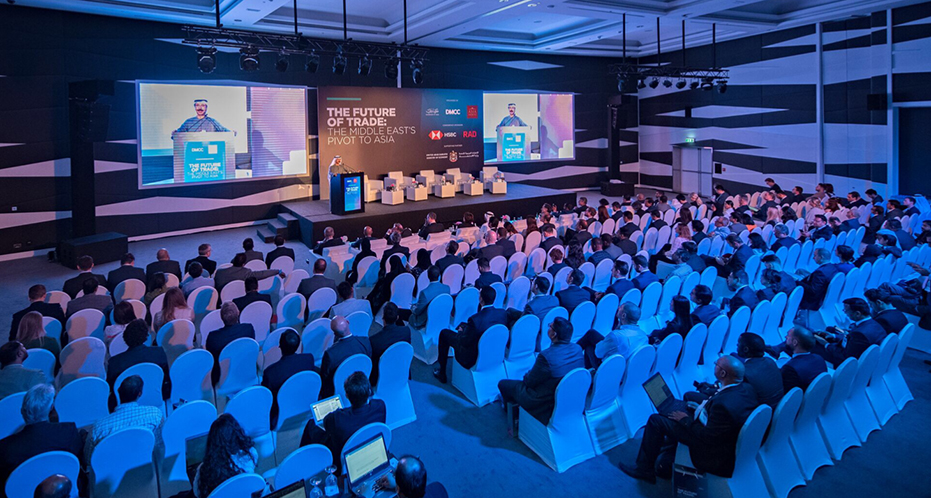Driving commercial and political engagement between Asia, the Middle East and Europe
Driving commercial and political engagement between Asia, the Middle East and Europe
Driving commercial and political engagement between Asia, the Middle East and Europe

The forces shaping the future of trade were discussed by leading figures from government and business today during Asia House’s major conference in Dubai, held in partnership with DMCC.
The Future of Trade: The Middle East’s Pivot to Asia conference welcomed thought leaders from government, trade, investment and technology to discuss, debate and analyse the latest shifts in the world economy.
Held in association with the Government of Dubai and sponsored by HSBC and ABP Royal Albert Dock London, the discussions at the conference focused on the anticipated trends in the future of trade, renewable energy and digital technologies.
The conference keynote speech was delivered by His Excellency Abdulla Al Saleh, Undersecretary for Foreign Trade, Ministry of Economy.
“The UAE and Asia have long enjoyed strong bilateral trade relations,” His Excellency said.
“Asian countries account for 60 per cent of the UAE’s non-oil trade while 55 per cent of the UAE’s imports come from Asia. For example, the UAE’s strategic location and ease of doing business play a critical role in China’s Belt and Road Initiative, with 4,000 Chinese companies already operating in the country.
“As the UAE’s largest partner for non-oil imports, India remains a core market for us, also offering significant growth opportunities.”
The conference also heard from the His Excellency Sultan Ahmed Bin Sulayem Group Chairman and Chief Executive of DP World – the global logistics enterprise and enabler of trade.
“Despite ongoing concerns around the US and China trade, and the uncertainties brought about by Brexit, we recognise that trade remains inevitable and vital for global economic growth. The UAE is uniquely positioned to capitalise on opportunities even where challenges exist. We have attracted an impressive pool of talent carrying creative ideas that have placed us at the forefront of innovation.”
The dramatic changes taking place in the global economic landscape were explored in the first panel session, The Future of Trade, which saw a lively discussion chaired by Michael Lawrence, Chief Executive of Asia House.
Kyle Boag, Regional Head of International Subsidiary Banking MENAT, HSBC; Neil Cuthbert, Senior Legal Advisor Middle East, Dentons & Co; Flynt Leverett, Professor of International Affairs at Penn State University and former US Government Senior Director for Middle East Affairs at the National Security Council; and Shan Huang, Associate Managing Editor of Caixin Media and Senior Research Associate at Notre Dame University, all shared their insights on US-China tensions and the Middle East’s economic shift towards Asian markets.
Next on the agenda was a conversation on Brexit between Lord Green, Chairman of Asia House, and Anne Ruth Herkes, Former State Secretary at German Federal Ministry for Economic Affairs and Energy. The immersive dialogue focused on the difficulty of securing a deal before the extended deadline and the potential impact that exiting the EU will have on the UK’s power in trade negotiations.
One of the biggest drivers of change in the business landscape is the digital revolution, and this was the subject of the second panel session. How FinTech, blockchain and Artificial Intelligence are revolutionising international trade was discussed by Sunil Veetil – Regional Head of Trade and Receivables Finance, HSBC MENA; Anthony Butler, Chief Technology Officer for IBM’s blockchain practice, Middle East and Africa; Andrew Sims, Chief Executive Officer of NEC Payments and an Executive Director of Bahrain FinTech Bay; Luan Tian, Director of Global Incubation, Innoway.
The final panel discussion focused on renewable energies – a key issue for the Middle East as its economies seek to diversify away from hydrocarbons.
Michelle Davies, Head of Clean Energy and Sustainability, Eversheds Sutherland; and Daniel Calderon, Co-founder and Chief Executive Officer, Alcazar Energy; and Laurent Longuet, CEO, SirajPower, took on the debate around the Middle East’s natural shift towards Asia to help expedite their diversification efforts.
The conference, which attracted more than 250 delegates, was supported by HSBC and ABP Royal Albert Dock London and held in association with the Government of Dubai.
It was organised as part of the Asia House Middle East Programme – an ongoing series of briefings, events and research aimed at driving engagement with the region.
Lord Green, Chairman of Asia House, said: “It is clear that Asia will play an increasingly important role for the Middle East as the region seeks to diversify away from energy exports. We are already seeing new trade relationships grow. Research by Asia House last year demonstrated a clear pivot towards Asia from markets in the Middle East, and this trend seems set to continue.
“We are delighted to have brought key figures in global trade together for today’s dialogue here in Dubai – a city which stands to benefit greatly from Asia’s ascendance.
“The conference marks an important contribution to the Middle East’s ongoing engagement with Asia.”
Ahmed Bin Sulayem, Executive Chairman at DMCC added: “Despite subdued global growth figures, this event highlighted that there is cause for optimism for those of us in the region.
The world’s economic gravity continues to shift eastwards and as a natural corridor, Dubai’s ability to link Asia with the Middle East, Europe and Africa has never been more important.”
For more information about the Asia House Middle East Programme, please email Cordelia Begbie, Middle East Programme Manager, at cordelia.begbie@asiahouse.co.uk
